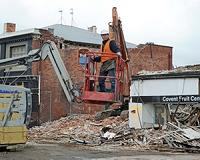| . |  |
. |
Tokyo (AFP) April 7, 2011 The Bank of Japan on Thursday warned of the pressures on an economy reeling from its biggest recorded earthquake, a tsunami and nuclear crisis, and unveiled a lending scheme for banks in affected areas. It left its key rate unchanged at between zero and 0.1 percent and downgraded its view of the economy due to last month's disasters, which have plunged the nation into its worst crisis since World War II. "Japan's economy is under strong downward pressure, mainly on the production side, due to the effects of the earthquake disaster," the central bank said. "The earthquake has sharply dampened production in some areas by damaging production facilities, disrupting the supply chain, and constraining electric power supply." In a bid to ensure financial institutions in disaster-hit areas can meet demand for post-quake reconstruction funds, the BoJ unveiled a 1.0 trillion yen ($11.7 billion) scheme offering 0.1 percent interest one-year loans. It also said it would consider broadening the range of eligible collateral for money market operations for banks in affected regions. Chief Cabinet Secretary Yukio Edano said the government is eyeing an initial extra budget of more than four trillion yen this month to finance the first wave of reconstruction in the northeastern region, Kyodo news reported. Japan's biggest companies are still trying to gauge the full impact of the March 11 disasters which have left more than 27,000 dead or missing. The damage crippled supply chains and led to power outages that have forced the likes of Toyota, Honda and Sony to shutter plants. Output overseas has also been compromised, with a shortage of key components sending shockwaves through global markets. However, analysts saw the BoJ's move as a small step with limited economic benefits, which suggested it was holding back in anticipation of the need for more dramatic action later. "It's just a very small amount," said Christian Carrillo, senior rates strategist at Societe Generale. "It's not something that's like really expanding purchases of Japanese Government Bonds so the government could directly spend more money in the economy, and it's not clear that it can be used very quickly." BoJ governor Masaaki Shirakawa on Thursday said that a move by the bank to directly purchase JGBs would undermine confidence in the yen and push up long-term interest rates. "It is extremely important to maintain trust in the currency, both internationally and domestically," he told reporters. In the immediate aftermath of the earthquake, the BoJ injected a record amount of cash into the banking system and doubled its asset purchase fund to 10 trillion yen, a key policy tool it kept unchanged Thursday. The total cost from collapsed or damaged houses, factories and infrastructure such as roads and bridges is estimated at 16-25 trillion yen over the next three fiscal years, according to the Cabinet Office. The upper estimate would put the disaster's financial impact at more than double the 9.6 trillion yen of the 1995 Kobe earthquake, which killed more than 6,400 people. The estimate does not account for wider issues such as how radiation from the stricken Fukushima Daiichi nuclear plant will affect food and water supply, amid an ongoing food scare. Many see Japan sliding into recession as a result of the impact of the disasters. The BoJ's Tankan survey Monday showed Japanese business confidence in the outlook for the next three months had plunged. Manufacturing activity fell to its lowest reading for two years following the March 11 disaster, a survey by a private research firm showed last week. And domestic sales of new cars, trucks and buses dropped 37 percent from a year earlier last month, as production and supplies to auto dealers were hit. "The news on Japan's economy is likely to get worse before it gets better", said Capital Economics in a research note. The Organization for Economic Cooperation and Development said this week that Japan's growth in the first quarter might be reduced by up to 0.6 percentage points and as much as 1.4 percentage points in the second quarter. -- Dow Jones Newswires contributed to this story --
Share This Article With Planet Earth
Related Links Bringing Order To A World Of Disasters A world of storm and tempest When the Earth Quakes
 New Zealand ready to bail out quake-hit insurer
New Zealand ready to bail out quake-hit insurerWellington (AFP) April 7, 2011 New Zealand said it was prepared to bail out one of the country's largest insurers Thursday amid fears it could be unable to pay claims stemming from two major earthquakes in Christchurch. Finance Minister Bill English said the government was ready to invest NZ$500 million ($390 million) in AMI Insurance if required and could also take control of the company if necessary. "The support pa ... read more |
|
| The content herein, unless otherwise known to be public domain, are Copyright 1995-2010 - SpaceDaily. AFP and UPI Wire Stories are copyright Agence France-Presse and United Press International. ESA Portal Reports are copyright European Space Agency. All NASA sourced material is public domain. Additional copyrights may apply in whole or part to other bona fide parties. Advertising does not imply endorsement,agreement or approval of any opinions, statements or information provided by SpaceDaily on any Web page published or hosted by SpaceDaily. Privacy Statement |